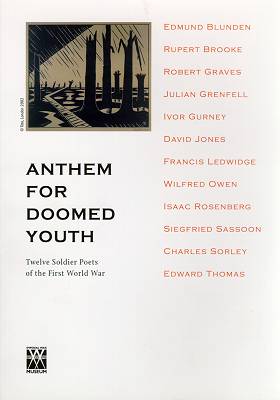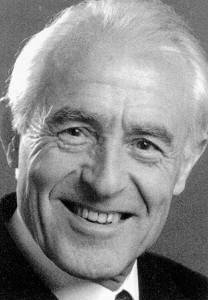|
BEHIND THE LINES

On the 65th anniversary of Ivor Gurney's death,
RODERIC DUNNETT takes a look at some First World War
composers, and at an Imperial War Museum exhibition in London
which pays tribute to Gurney and his fellow wartime poets
- When you see millions of the mouthless dead
Across your dreams in pale battalions go,
Say not soft things ... For, deaf, how should they know
It is not curses heaped on each gashed head?.
This vision of stark horror comes not from Wilfred Owen, not from Gurney
or even Sassoon, but from the young Aberdonian Charles Sorley, one of twelve
Soldier Poets -- three of them artists and one of them a composer -- whose
work features in a major exhibition running until the end of April 2003
at the Imperial War Museum in London.

Anthem for Doomed Youth - Twelve Soldier Poets of the First World War
|
Sorley, who succumbed to a sniper's bullet at the Battle of Loos
in October 1915, was the second of the twelve and, at just twenty, the youngest
to die in battle. He was one of the first war poets to sense the truth about
trench warfare, as the exhibition's artistic adviser, Jon Stallworthy, Wilfred
Owen's biographer, former Professor of English at Oxford and now senior
research fellow at Wolfson College, points out :

John Stallworthy. Photo: The Imperial War Museum, London
|
'Sorley was a classic public schoolboy officer', says Stallworthy
(a fellow-poet who himself served his national service in the British military
in West Africa). 'After Marlborough, where he started writing poetry, he'd
been to Germany (Schwerin and the University of Jena), and liked it -- although
not uncritically. When he joined up, it was with no great enthusiasm. Not
many of those visiting the exhibition may have heard of him, but despite
his youthful age he was the first of the British writers who really grasped
the truth about the war.'
On the other side, poets like Trakl grasped the truth even quicker :
for Sorley the sight of German dead will have appalled him as much as the
British : 'Victor and vanquished are a-one in death'; a dead 'Fritz'
was a dead colleague. There was no triumph in war :
- Such, such is Death : no triumph, no defeat :
Only an empty pail, a slate rubbed clean,
A merciful putting away of what has been ...
(Two Sonnets, Ploegsteert, June 1915).
Continue >>
Copyright © 26 December 2002
Roderic Dunnett, Malvern, Worcestershire, UK

|

